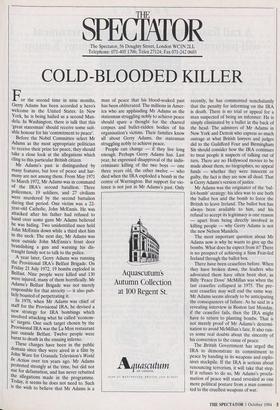SPECTATOR
The Spectator, 56 Doughty Street, London WC1N 2LL Telephone: 071-405 1706; Telex 27124; Fax 071-242 0603
COLD—BLOODED KILLER
For the second time in nine months, Gerry Adams has been accorded a hero's welcome in the United States. In New York, he is being hailed as a second Man- dela. In Washington, there is talk that this `great statesman' should receive some suit- able honour for his 'commitment to peace'.
Before the Nobel Committee select Mr Adams as the most appropriate politician to receive their prize for peace, they should take a close look at the allegations which cling to this particular British citizen.
Mr Adams's past is distinguished by many features, but love of peace and har- mony are not among them. From May 1971 to March 1972, Mr Adams was in command of the IRA's second batallion. Three policemen, 19 soldiers, and 27 civilians were murdered by the second battalion during that period. One victim was a 22- year-old Catholic, John McEnnis. He was attacked after his father had refused to hand over some guns Mr Adams believed he was hiding. Two unidentified men held John McEnnis down while a third shot him in the neck. The next day, Mr Adams was seen outside John McEnnis's front door brandishing a gun and warning his dis- traught family not to talk to the police. A year later, Gerry Adams was running the Provisional IRA's Belfast Brigade. On Friday 21 July 1972, 19 bombs exploded in Belfast. Nine people were killed and 130 were injured, many of them horrifically. Mr Adams's Belfast Brigade was not merely responsible for that atrocity — it also pub- licly boasted of perpetrating it. In 1978, when Mr Adams was chief of staff for the Provisional IRA, he devised a new strategy for IRA bombings which involved attacking what he called `econom- ic' targets. One such target chosen by the Provisional IRA was the La Mon restaurant just outside Belfast. Twelve people were burnt to death in the ensuing inferno. These charges have been in the public domain since they were aired in a film by John Ware for Granada Television's World In Action over ten years ago. Mr Adams protested strongly at the time, but did not sue for defamation, and has never rebutted the allegations made in the programme. Today, it seems he does not need to. Such is the wish to believe that Mr Adams is a man of peace that his blood-soaked past has been obliterated. The millions in Amer- ica who are applauding Mr Adams as the statesman struggling nobly to achieve peace should spare a thought for the charred corpses and bullet-ridden bodies of his organisation's victims. Their families know all about Gerry Adams, the statesman struggling nobly to achieve peace.
People can change — if they live long enough. Perhaps Gerry Adams has. Last year, he expressed disapproval of the indis- criminate killing of the two boys — one three years old, the other twelve — who died when the IRA exploded a bomb in the centre of Warrington. But support for vio- lence is not just in Mr Adams's past. Only recently, he has commented nonchalantly that the penalty for informing on the IRA is death. There is no trial or appeal for a man suspected of being an informer. He is simply eliminated by a bullet in the back of the head. The admirers of Mr Adams in New York and Detroit who express so much outrage at what British lawyers and judges did to the Guildford Four and Birmingham Six should consider how the IRA continues to treat people it suspects of talking out of turn. There are no Hollywood movies to be made about them, no biographies, no appeal funds — whether they were innocent or guilty, the fact is they are now all dead. That is Gerry Adams's version of justice.
Mr Adams was the originator of the 'bal- lot-bomb' strategy: his idea was to use both the ballot box and the bomb to force the British to leave Ireland. The ballot box has always been available to him, and his refusal to accept its legitimacy is one reason — apart from being directly involved in killing people — why Gerry Adams is not the new Nelson Mandela.
The most important question about Mr Adams now is why he wants to give up the bombs. What does he expect from it? There is no prospect of achieving a Sinn Fein-led Ireland through the ballot box.
There have been ceasefires before. When they have broken down, the leaders who advocated them have often been shot, as Billy 'Peace Dove' McMillan was when the last ceasefire collapsed in 1975. The pre- sent ceasefire may well end the same way. Mr Adams seems already to be anticipating the consequences of failure. As he said in a revealing interview in Boston last Monday, if the ceasefire fails, then the IRA might have to return to planting bombs. That is not merely proof of Mr Adams's determi- nation to avoid McMillan's fate. It also rais- es some real doubts about the sincerity of his conversion to the cause of peace.
The .British Government has urged the IRA to demonstrate its commitment to peace by handing in its weapons and explo- sives stockpile. If the IRA is serious about renouncing terrorism, it will take that step. If it refuses to do so, Mr Adams's procla- mation of peace will stand revealed as one more political posture from a man commit- ted to the cruellest weapons of war.


























































 Previous page
Previous page